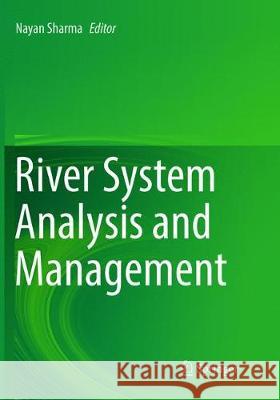River System Analysis and Management » książka



River System Analysis and Management
ISBN-13: 9789811093630 / Angielski / Miękka / 2018 / 417 str.
River System Analysis and Management
ISBN-13: 9789811093630 / Angielski / Miękka / 2018 / 417 str.
(netto: 651,74 VAT: 5%)
Najniższa cena z 30 dni: 655,41
ok. 16-18 dni roboczych.
Darmowa dostawa!
1. Introduction.- Part 1: Sediment Transport.- 2. Forest Impact on Flood Peak Discharge and Sediment Yield in Stream Flow.- 3. On the Physical and Operational Rationality of Data-Driven Models for Suspended Sediment Prediction in Rivers.- 4. Sediment dynamics in a large alluvial river: Characterization of materials and processes and management challenges.- 5. Sediment Runoff Modelling Using ANNs In An Eastern Himalayan Basin, India.- Part 2. Land Use and Climate.- 6. River Basin Impact Assessment of Changing Land Use and Climate by Applying the ILWRM Approach in Africa and Asia.- 7. Analysis of Climate Variability in A part of Brahmaputra River Basin in India.- Part 3. River Hydraulics.- 8. Local Scour.- 9. Emerging Methodologies for Turbulence Characterization in River Dynamics Study.- Part 4. River Modelling.- 10. Prospects of Modelling and Morpho-Dynamic Study for Brahmaputra River.- 11. Development of a Fuzzy Flood Forecasting Model for Downstream of Hirakud Reservoir of Mahanadi Basin, India.- 12. Distributed Hydrological Modelling under Hypothetical Climate Change Scenario for a Sub-Basin of the Brahmaputra River.- Part 5. River Training.- 13. River Management with Submerged Vanes.- 14. Behavior and Training of River Near Bridges and Barrages - Some Case Studies.- 15. Design Development and Field Application of RCC Jack Jetty and Trail Dykes for River Training.- 16. Kusaha Breach Closure of River Kosi - A Case Study.- Part 6. Water Quality And Ecology.- 17. Preliminary Assessment and Attempt to Maintain Minimum Ecological Flows in Upper and Middle Ganga River.- Part 7. Transboundary River Issues.- 18. Opportunities and Challenges in the Transboundary Koshi River Basin.- 19. Hydropolitics in Transboundary Water Conflict and Cooperation.- Part 8. Disaster Management.- 20. Flood Disaster Management.
Prof. Dr. Nayan Sharma is with IIT Roorkee, teaching, researching and consulting on Water Resources including River Engineering, Hydraulic Structures, Inland Navigation and Concrete Dams. Earlier, in Assam Flood Control and Irrigation Dept., he was associated with design and implementation of several barrages / dams, river training structures in the Brahmaputra basin. He has been supervisor of 166 M.Tech theses and 20 Ph.Ds in IIT Roorkee, and examiner of 9 Ph.D. theses, with 178 research publications. He is member of 58 national and international technical committees. He conducted 79 consulting, and 9 National & International Research Projects. He published three books by Springer and INCID. He was recipient of Indo-Swiss Bilateral Research Award as Visiting Professor in Swiss Federal Institute of Technology Lausanne. He delivered talks in The Imperial College London, Southampton University and Edinburgh University in the UK; University of Lausanne in Switzerland, Iowa University in the USA, IST Lisbon in Portugal, Gottingen University in Germany and in ENGINEERS CONCLAVE – 2014 at IISc Bangalore. He delivered Dr. K. L. Rao Memorial Lecture in 26th National Convention of Institution of Engineers (India). He gainfully researched on new Piano Key Weir technology for dam safety and instream storage development as viable adaptation measure for climate change effects, and fruitfully got implemented his design of RCC Jack Jetty for channelizing Ganga reach near Varanasi with encouraging results. Based on his comprehensive model investigation, new Piano Key Weir technology was implemented in Sawra Kuddu Hydro Electric Project located on Pabbar river in Himachal Pradesh, India. Recently he has been appointed honorary professor of river sciences by the University of Nottingham, UK. Also is awarded with Jal Vigyan Puruskar by Indian Society of Hydraulics.
The main thrust of this book is focused on addressing the various interrelated processes, analysis and activities bearing upon sound river management. River basins are complex systems. They are open systems with sometimes ill-defined boundaries. It refers to various aspects essential to achieve a sustainable development of river basins, including water demand and river management, intensified erosion, land water degradation and stream flow pollution which call for appropriate river restoration and training measures. A viable theory for river management must reconcile the various processes that occur at different scales in order to develop a knowledge base by synthesizing research and field studies results. The book is intended to augment the knowledge base of behaviour of rivers and analyse the issues related to rivers so as to develop river system management techniques emerging from in-depth scientific analysis as a priority. This book pools together the expertise, the in-depth knowledge and the experience of the people representing different disciplines bearing on the related aspects of analysis and management of river systems.
Audience
The book is expected to be useful to academics, practitioners, scientists, water managers, environmentalists, administrators, researchers and students who are involved and have stakes in water management and river system analysis.
1997-2026 DolnySlask.com Agencja Internetowa
KrainaKsiazek.PL - Księgarnia Internetowa









